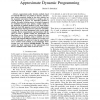15 search results - page 1 / 3 » Explaining and Controlling Ambiguity in Dynamic Programming |
CPM
2000
Springer
13 years 8 months ago
2000
Springer
Abstract. Ambiguity in dynamic programming arises from two independent sources, the non-uniqueness of optimal solutions and the particular recursion scheme by which the search spac...
BMCBI
2005
13 years 4 months ago
2005
Background: Ambiguity is a problem in biosequence analysis that arises in various analysis tasks solved via dynamic programming, and in particular, in the modeling of families of ...
ICFP
2007
ACM
14 years 4 months ago
2007
ACM
Operators for delimiting control and for capturing composable continuations litter the landscape of theoretical programming language research. Numerous papers explain their advant...
CDC
2008
IEEE
13 years 10 months ago
2008
IEEE
— This paper presents a new approximate policy iteration algorithm based on support vector regression (SVR). It provides an overview of commonly used cost approximation architect...
CDC
2010
IEEE
12 years 11 months ago
2010
IEEE
Approximate policy iteration methods based on temporal differences are popular in practice, and have been tested extensively, dating to the early nineties, but the associated conve...

